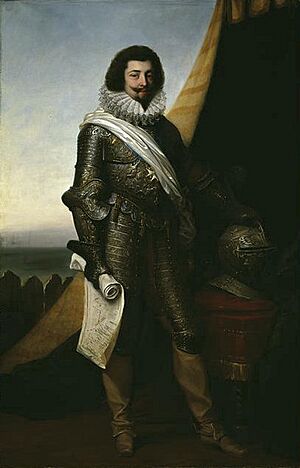François de Bassompierre facts for kids
François de Bassompierre (born April 12, 1579 – died October 12, 1646) was a famous French courtier. A courtier is someone who attends a royal court as an advisor or companion to the king or queen. He came from a noble family in Lorraine. François was known for his charm, military skills, and diplomatic efforts. He served several French kings and played a part in important events of his time.
Contents
Early Life and Royal Court
François de Bassompierre was born in 1579 at Haroué Castle. His family had a long history of serving the dukes of Burgundy and Lorraine. He and his brothers studied in Bavaria and Italy. In 1598, he was introduced to the court of King Henry IV of France. He quickly became a favorite of the king. François enjoyed the lively court life. In 1600, he took part in a short military campaign in Savoy. In 1603, he fought against the Turks in Hungary for Emperor Rudolf II.
Military Adventures
In 1614, Bassompierre supported Marie de' Medici, the queen mother. She was struggling against some nobles. When her efforts failed in 1617, he stayed loyal to the young King Louis XIII. He helped the king's forces defeat Marie's supporters at Les Ponts-de-Cé in 1620.
His service during the Huguenot uprising of 1621–22 earned him the title of marshal of France. A marshal is a high-ranking military officer. He was with the king's army during the siege of La Rochelle in 1628. In 1629, he showed great bravery in the campaign against the Huguenot rebels in Languedoc. He was especially noted for his actions at the Siege of Privas.
In 1615, Bassompierre bought the important position of colonel-general of the Swiss and Grisons troops. Because of this, he was sent to raise troops in Switzerland when Louis XIII marched against Savoy in 1629. After a brief campaign in Italy, his military career came to an end.
Diplomatic Missions
As a diplomat, Bassompierre faced some challenges. In 1621, he traveled to Madrid as a special envoy. His mission was to settle a disagreement about Spain taking over the Valtelline forts. He signed the Treaty of Madrid, but it did not solve the problem.
In 1625, he went to Switzerland for another mission that did not achieve its goals. In 1626, he was sent to London. His task was to make sure that the Catholic priests and staff of Henrietta Maria, who was married to King Charles I of England, could stay with her.
Imprisonment and Later Life
King Henry IV had previously stopped Bassompierre from marrying Charlotte de Montmorency. Between 1614 and 1630, Bassompierre was secretly married to Louise Marguerite. She was the widow of François, prince de Conti. Through her, he became involved in a plan to remove Cardinal Richelieu from power. This event is known as the "Day of the Dupes" (1630).
Bassompierre's role in the plot was small. However, his wife was a close friend of Marie de' Medici, and she strongly disliked Richelieu. This made the cardinal suspicious. On February 25, 1631, Richelieu ordered Bassompierre's arrest at Senlis. He was then sent to the Bastille prison. He remained there until Richelieu's death in 1643.
After his release, Bassompierre's old positions were given back to him. He spent most of his time at Tillières Castle in Normandy. He passed away in 1646 at the age of 67. He had a son named François de la Tour with the princesse de Conti. He also had an illegitimate son, Louis de Bassompierre, who later became the Bishop of Saintes.
Writings and Legacy
François de Bassompierre wrote his Mémoires. These are important writings that help us understand the history of his time. They were first published in Cologne in 1665. He also wrote an unfinished account of his diplomatic trips to Spain, Switzerland, and England. This was published in Cologne in 1668. He also left several other writings on different topics.
During his trip to King Charles I of England in 1626, Bassompierre was hosted by Sir Lewes Lewkenor. Sir Lewes was the Master of the Ceremonies. Bassompierre wrote about this visit, mentioning that Sir Lewes brought him a valuable gift from the king. Later that evening, Sir Lewes invited him to see "an excellent English play."
 | Bayard Rustin |
 | Jeannette Carter |
 | Jeremiah A. Brown |


